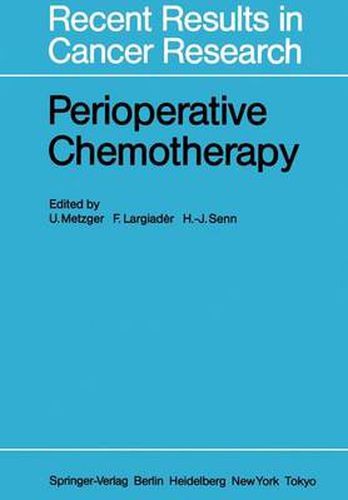Readings Newsletter
Become a Readings Member to make your shopping experience even easier.
Sign in or sign up for free!
You’re not far away from qualifying for FREE standard shipping within Australia
You’ve qualified for FREE standard shipping within Australia
The cart is loading…






This title is printed to order. This book may have been self-published. If so, we cannot guarantee the quality of the content. In the main most books will have gone through the editing process however some may not. We therefore suggest that you be aware of this before ordering this book. If in doubt check either the author or publisher’s details as we are unable to accept any returns unless they are faulty. Please contact us if you have any questions.
One reason for failure to cure solid tumors by surgery appears to be the impossibility of controlling metastases that are present but latent at the time of operation. This failure is a common clinical experience with aggressive neoplasms. but it is not always appreciated in tumors with longer survival times. e. g .* breast and colon cancer. In addition. recent evidence indicates that after resection of a primary tumor micrometas tases from it might be enhanced by suppression of immune and reticu loendothelial functions of the host. Other factors, such as increase of coagulability and stress in the perioperative period, can also promote tumor growth. The development of new metastases might be facilitated by cells forced into the circulation during operative manipulations. Such events could be important for the outcome of treatment and it is suggested that preventive measures should be directed to this systemic component of solid tumors. Radical surgery can reduce the number of tumor cells to a subclinical 3 6 stage (10 to 10 cells) in which chemotherapy might be more effective than in advanced stages. Chemotherapy, on the other hand, might aggravate the surgical morbidity by influencing the wound healing pro cess, by decreasing the immune response, and/or by toxicity to the bone marrow and to the gastrointestinal tract, for example.
$9.00 standard shipping within Australia
FREE standard shipping within Australia for orders over $100.00
Express & International shipping calculated at checkout
This title is printed to order. This book may have been self-published. If so, we cannot guarantee the quality of the content. In the main most books will have gone through the editing process however some may not. We therefore suggest that you be aware of this before ordering this book. If in doubt check either the author or publisher’s details as we are unable to accept any returns unless they are faulty. Please contact us if you have any questions.
One reason for failure to cure solid tumors by surgery appears to be the impossibility of controlling metastases that are present but latent at the time of operation. This failure is a common clinical experience with aggressive neoplasms. but it is not always appreciated in tumors with longer survival times. e. g .* breast and colon cancer. In addition. recent evidence indicates that after resection of a primary tumor micrometas tases from it might be enhanced by suppression of immune and reticu loendothelial functions of the host. Other factors, such as increase of coagulability and stress in the perioperative period, can also promote tumor growth. The development of new metastases might be facilitated by cells forced into the circulation during operative manipulations. Such events could be important for the outcome of treatment and it is suggested that preventive measures should be directed to this systemic component of solid tumors. Radical surgery can reduce the number of tumor cells to a subclinical 3 6 stage (10 to 10 cells) in which chemotherapy might be more effective than in advanced stages. Chemotherapy, on the other hand, might aggravate the surgical morbidity by influencing the wound healing pro cess, by decreasing the immune response, and/or by toxicity to the bone marrow and to the gastrointestinal tract, for example.